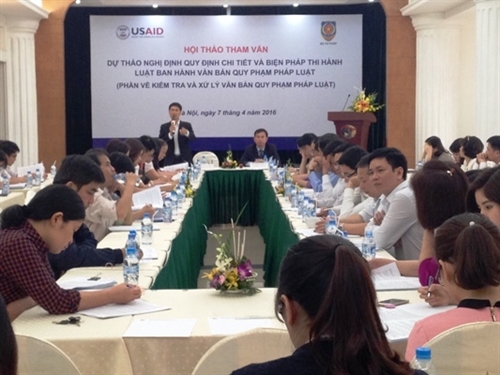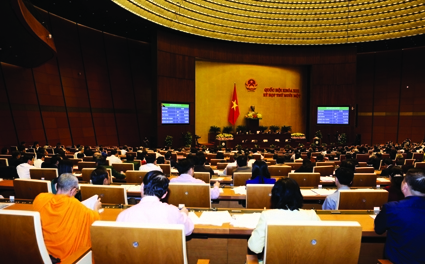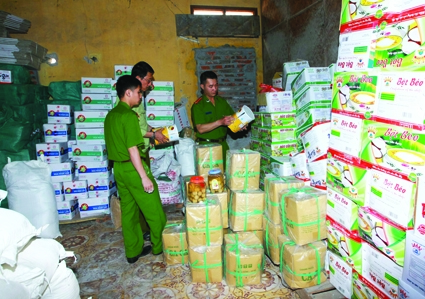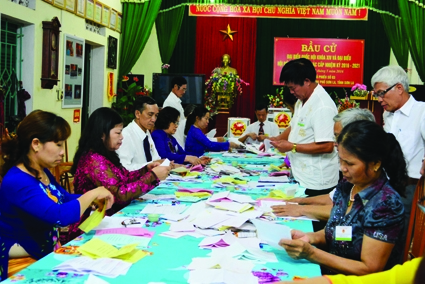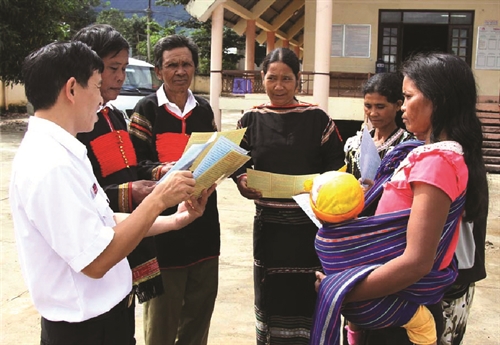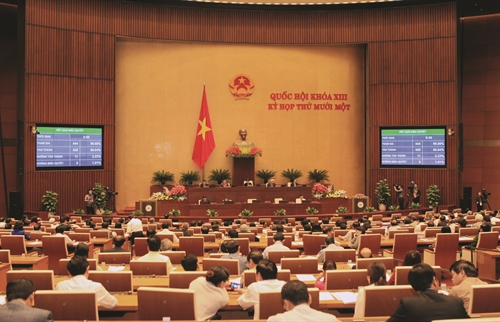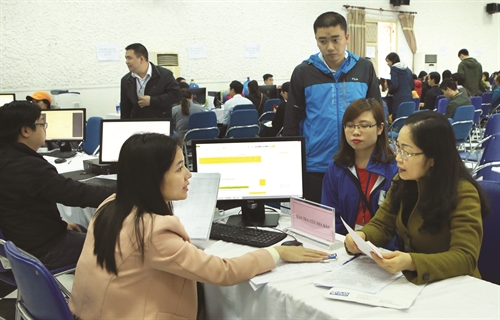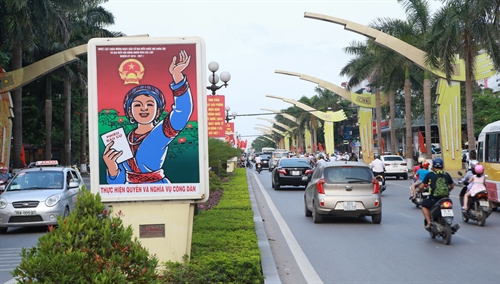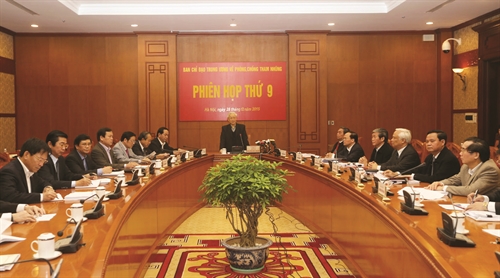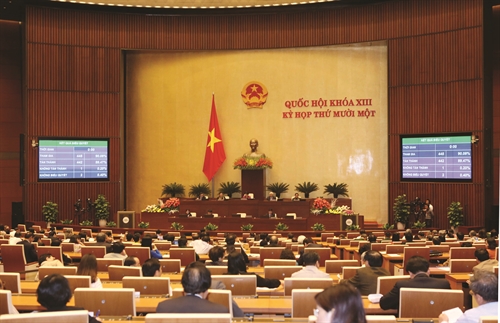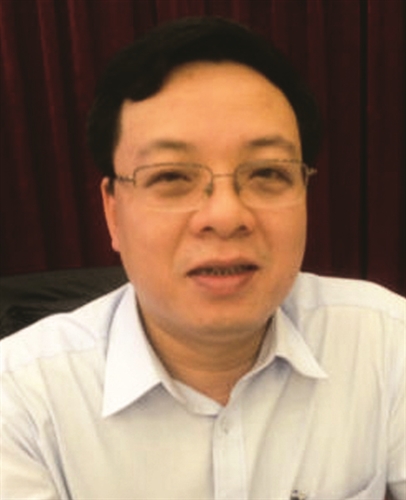 |
As a drafting agency, the Government Inspectorate has recently disclosed the draft revised Anti-Corruption Law for public opinion. What are the new contents of this draft?
In order to overcome the limitations as addressed through 10-year implementation of the current Anti-Corruption Law, the draft Law focuses on the following contents:
Firstly, its scope of regulation expands to the non-state sector.
Article 1 of the draft puts it in a brief and general way: “This Law prescribes the prevention, detection and handling of corruption and responsibilities of agencies, organizations, units and individuals in the prevention of and fight against corruption.”
Compared to the current Law, the draft removes the phrase “persons committing corrupt acts” in order to expand its application to, besides the handling of persons committing corrupt acts, the handling of related agencies, organizations and individuals, and to the disposal of property and incomes that cannot be explained reasonably. At the same time, the draft adds the group of “persons holding managerial positions in non-state organizations and enterprises” to the category of persons regulated by the Law.
Secondly, the draft continues to forge ahead the implementation of publicity and transparency measures.
In order to effectively ensure publicity and transparency in the organization and operation of agencies, organizations and units, the draft Law makes more enforceable provisions. It removes 18 articles of the current Law which have been prescribed in a number of particular laws (Articles 13 to 30) and focuses on providing for the principles, contents and forms of publicity, especially saying that the responsibility for publicity belongs to the heads of agencies, organizations and units. Other provisions relate to press conferences and spokespersons, the right to request information, the responsibility to give explanations, and the handling of violations in the implementation of publicity and transparency (Articles 12 to 18 of the draft Law). At the same time, considering assessment of the situation of corruption and anti-corruption work an extremely important task, the draft provides in Articles 20 and 21 the reporting on the situation of corruption and anti-corruption work. According to these articles, state agencies will have to measure corruption and conduct anti-corruption assessment and disclose the anti-corruption report annually. At the same time the society, led by the Vietnam Fatherland Front, will organize its own corruption measurement and evaluation of anti-corruption work, with the people’s participation.
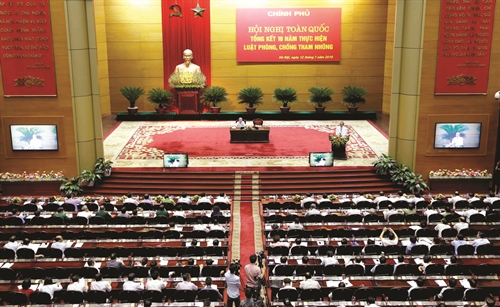 |
| The conference to review 10 years’ implementation of the Anti-Corruption Law held by the Government Office on July 12 __Photo: An Dang/VNA |
Thirdly, the draft has new provisions on integrity.
Building integrity in activities of agencies, organization and units is one of important pillars of anti-corruption work. This new institution has been developed on the basis of gathering and systematizing provisions scattered in the current Law and other related laws, covering the code of conduct of cadres, civil servants and public employees and their prohibited acts; giving and receipt of presents; code of professional ethics and code of business ethics (Articles 24 to 26). The draft introduces new provisions on integrity education and responsibilities of education authorities and the Government Inspectorate for providing integrity education.
Fourthly, the draft revised Law makes provisions on control of conflicts of interest.
Conflict of interest refers to a circumstance in which a person may gain benefits for himself or herself or for his or her relatives when performing or failing to perform an assigned task or official duty. Albeit a new concept, the issue of conflict of interest has been touched upon in the current Law and many other laws and regulations. Recognizing the importance of the control of conflicts of interest in the prevention of and fight against corruption (eliminating a condition for committing corrupt acts), the draft Law creates a separate institution on this issue, covering a definition of this concept; responsibility to inform and report on conflicts of interest; responsibility to process information and reports; handling of violations and control measures of conflicts of interest in agencies, organizations and units (Articles 29 to 32).
Fifthly, the draft Law comprehensively revises provisions on transparency and monitoring of property and incomes.
The draft Law has a separate chapter with many new, substantial provisions on monitoring property and incomes of cadres, civil servants, public employees and a number of persons holding positions and powers in public companies, credit institutions and investment funds. This chapter regulates property and income declaration; management of declaration sheets; monitoring of property and income changes; verification of property and incomes; handling of violations and disposal of property and incomes that are declared dishonestly or cannot be explained in a reasonable manner. According to Article 39, transparency and monitoring of property and incomes refer to declaration of property and incomes, management and disclosure of declaration sheets, verification, explanation, conclusion and handling of violations of transparency and monitoring of property and incomes in order to prevent, detect and handle corruption. Particularly, to address formalistic monitoring, the draft clearly identifies agencies and units responsible for monitoring property and incomes, including the Party Central Committee’s Inspection Commission, the Government Inspectorate; the Supreme People’s Court; the Supreme People’s Procuracy, the State Audit Office, inspectorates of ministries, ministerial-level agencies, agencies’ organization and personnel departments; the provincial or municipal Party committees’ inspection agencies, and provincial inspectorates.
Sixthly, the draft Law revises provisions to increase the effectiveness of the detection and handling of corruption.
The draft says that competent agencies are responsible for detecting corruption through examination, inspection, audit and oversight activities. This is also a new content of the draft Law in line with the spirit of enhancing the responsibility of competent agencies to identify cases of corruption before referring them to judicial agencies. The draft Law institutionalizes the role of the system of the Party’s inspection agencies in handling corrupt persons. It provides grounds for conducting inspections and audits of suspicious cases of corruption, the handling of corrupt acts detected through examination, inspection and audit activities; disposal of property related to corrupt acts, etc.
The draft also expands the methods of receiving information on corruption as compared to the current Law, including information, reports and denunciations. This would facilitate the receipt and collection of information on corruption by competent agencies and encourage the provision of such information by the public. The draft Law contains clearer provisions on the responsibility to receive and process information, reports and denunciations about corruption and more specific provisions on commendation of corruption whistleblowers.
Seventhly, the draft adjusts the anti-corruption apparatus in line with practical conditions.
Article 92 of the draft Law stipulates that the National Assembly will decide to set up an interim committee to probe into serious and complicated corruption cases in line with Articles 88 and 89 of the Law on Organization of the National Assembly and at the proposal of its Standing Committee. Article 93 of the draft Law stipulates the responsibilities of the Central Party Committee’s Inspection Commission in anti-corruption work. This is a new provision institutionalizing the functions and tasks of this body in handling corruption cases.
Eighthly, the draft enhances the anti-corruption responsibility of heads, mentioning “resignation” for the first time.
The draft clearly and specifically defines those who are called “heads of agencies, organizations or units” so as to facilitate the determination and individualization of responsibilities in anti-corruption work. It provides the responsibility of these heads and their deputies for corrupt acts occurring in their agencies, organizations or units and the responsibility to apply such measures as suspension from work and temporary transfer to another working position to cadres, civil servants or public servants suspected of committing corrupt acts.
Noteworthily, the draft makes a new provision that the head of an agency, an organization or a unit who voluntarily resigns before being examined for his or her responsibility will not face discipline. This provision aims to raise the political responsibility of the head, helping form a “culture of resignation” when there are violations occurring in an agency, an organization or a unit.
Ninthly, the draft continues to call for the society’s participation in anti-corruption work.
The draft Law also devotes a separate chapter dealing with the role and responsibility of the society, including the Vietnam Fatherland Front and its member organizations, the press; citizens, people’s inspection boards, investment supervision boards of the communities, in the prevention of and fight against corruption. Particularly, the draft Law says that social organizations, socio-professional organizations, charity societies and other lawfully established associations will have to take measures to prevent, detect and handle corruption in their activities, making public members’ contributions and donations and their management and use.
Tenthly, the draft Law provides the building of a healthy and non-corrupt culture in the business community.
These provisions in the draft emphasize the role of businesses in the fight against corruption, stipulating that businesses must work out their own code of conduct and internal control rules to prevent corruption in their own businesses. These provisions also define anti-corruption responsibilities of businesses and ways of monitoring property and incomes of business managers.
Finally, the draft contains revised provisions on international cooperation in the recovery of corruption-related property.
According to these provisions, the Supreme People’s Procuracy will act as the national focal point in cooperation with foreign countries to recover corruption-related property. It will be responsible for receiving and handling requests for recovery of corruption-related property from foreign and Vietnamese agencies, organizations and individuals.
You have just mentioned that the draft Law extends its scope of regulation to the non-state sector. Could you elaborate more on this change?
The reason why the draft addresses anti-corruption activities in non-state organizations and enterprises is to meet the current practical requirement in line with the policy on combating corruption crimes in the non-state sector in the 2015 Penal Code.
However, taking into consideration the present development and management of the non-state sector, the drafting agency holds that this move should be taken step by step, with focuses and priorities.
In the immediate future, the draft requires public companies, commercial banks and investment funds to apply certain anti-corruption measures, including ensuring publicity and transparency of property and incomes, implementing the integrity regime and the head’s responsibility regime, and inspecting and examining the observance of the anti-corruption law. In these economic institutions, owners and managers have their own duties as well as separate interests and this is a condition for the risk of managers abusing their positions and powers, or in other words, committing corrupt acts in the private sector. As for other non-state entities, the draft just provides general principles of anti-corruption work and inspection and examination activities. The noteworthy point here is that enterprises will take the initiative in applying anti-corruption measures suitable to their own business activities. The draft only holds them responsible for detecting and handling internal corrupt acts and for reporting signs of crime to competent authorities for consideration and handling.
 |
| Communist Party of Vietnam General Secretary Nguyen Phu Trong chairs the 10th session of the Central Steering Committee for Corruption Prevention and Control on April 27 __Photo: Tri Dung/VNA |
Property and income transparency and monitoring are a key issue in the draft revised Law. Could you give more details on the changes relating to this issue?
The first change lies in the property and income declaration.
The draft retains the current provisions on the obligation to declare property and incomes, but it makes clearer that a declarant must declare not only his or her own property and incomes but also those of his or her spouse and minor children.
Regarding persons obliged to make declaration, the draft says that all persons who are appointed for the first time as public employees; civil servants holding leading or managerial posts; cadres and public employees who are elected, appointed, re-appointed or assigned to hold positions in state agencies, political organizations, socio-political organizations, socio-politico-professional organizations and other organizations that operate with state budget funds, will have to declare their property and incomes. The draft also requires persons working at public companies, credit institutions and investment funds to declare their property and incomes in line with the provisions mentioned above.
The draft Law abolishes the requirement on annual declaration and replaces it with initial declaration and supplementary declaration. It provides that right after the Law comes into force, initial declaration must be made by all persons who are obliged to make declaration and by persons who are appointed for the first time and persons expected to be elected, appointed, re-appointed or assigned to act as representatives of the state capital at enterprises who have never made property and income declaration. Supplementary declaration is required for persons who have made initial declaration and are proposed to be elected, appointed, re-appointed or assigned to act as representatives of the state capital at enterprises or for persons whose property and incomes increase by VND 200 million or more. With these provisions, although more subjects will be obliged to declare property and incomes, the number of declaration sheets to be made every year will significantly reduce.
The draft retains the current Law’s provisions on disclosure of declaration sheets, with some revisions to redress the formalistic disclosure. The property and income declaration sheet of a person expected to be elected, appointed, re-appointed or assigned to hold a leading post will be disclosed at a voters’ conference or a meeting to elect or cast votes of confidence on such person.
The second change is related to the management of property and income declaration sheets.
Under the current Law, organization and personnel departments of agencies or organization where declarants are working are responsible for managing their property and income declaration sheets. This provision has been identified as a limitation of the current Law, leading to the rare verification of property and incomes of declarants over the past 10 years.
The draft Law solves the problem by establishing a mechanism of centralized management of declaration sheets. Accordingly, declaration sheets will be managed by a body competent to monitor the declarants’ property and incomes, which is regarded to be “relatively independent” from the managing or employing agency or unit of the declarants. The draft Law also provides the procedures for receiving declaration sheets and the building of a national database on declaration sheets.
The third change is the introduction of a mechanism for monitoring changes in property and incomes, which aims to redress formalism in the current property and income declaration.
The draft says that a property and income monitoring body must proactively collect, exploit and update information and data from property and income declaration sheets. When necessary, it may request declarants to explain their increased property and incomes and may decide to conduct verifications.
The draft Law places importance on property and income verification as an effective tool to control changes in property and incomes and detect signs of corruption. This is the fourth change.
Compared to the current Law, the draft Law adds grounds for conducting a property and income verification. It says a verification will be conducted when a declaration sheet is believed to be untruthful or cannot be explained reasonably or when there is a denunciation.
Verification will be compulsory for a person expected to be elected, appointed or assigned to hold a leading position with a responsibility allowance coefficient of 0.9 or higher. For other cases, verification may be decided by heads of agencies and units employing the declarants.
The draft Law also makes it clear that property and income monitoring bodies have competence to conduct property and income verifications.
The last change concerns the disposal of property and incomes which are untruthfully declared or cannot be explained reasonably.
In case the result of a verification reveals that the actual value of a property or actual income of the declarant is higher than declared but the declarant can give reasonable explanations about the difference, the property and income monitoring body can request the tax authority to collect tax. If such person cannot give any reasonable explanations, the property and income monitoring body will lodge a civil case to a competent court to rule on the ownership over the surplus in according to civil proceedings laws.-
